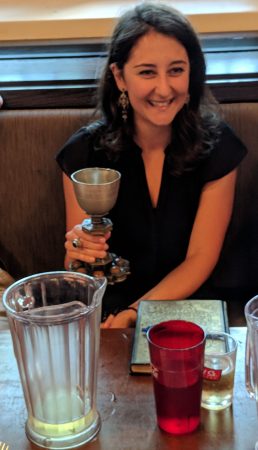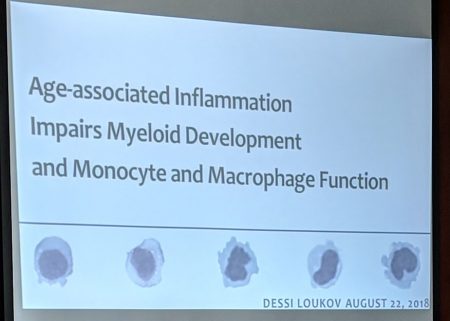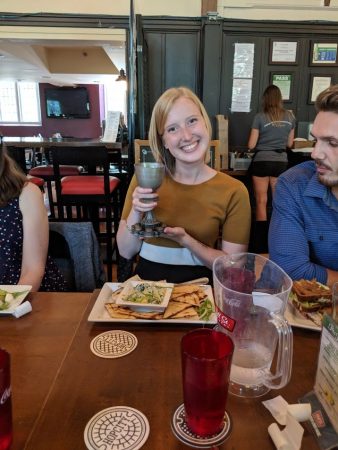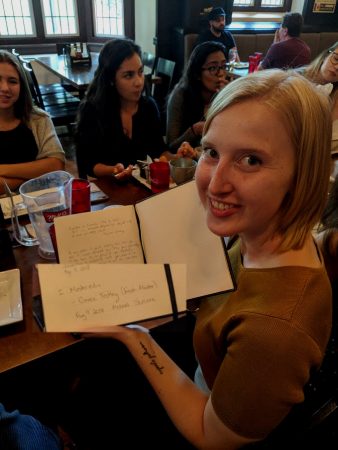Dr. Bowdish speaks about the role of the microbiome in inflammation and healthy/unhealthy aging (starting at 26:02). Other speakers include Dr. Luigi Ferrucci from the NIH Institute of Aging and Dr. James Kirkland who speaks about clinical trials testing senolytics.
Tag Archives: inflammation
Publication: Is Lung Health Good Health For Older Adults?
November is Lung Month – what do older adults need to know about pneumonia?
Dr Bowdish is the Canadian Lung Association’s spokesperson for World Pneumonia Day (November 12, 2018). Here she discusses the importance of being vaccinated for pneumonia….
She also speaks to Zoomer Magazine about pneumonia, vaccinations and the aging immune system here…
To get a sense of the other lung research going on in the Bowdish lab, see our Instagram page: house.macrophage
>
Publication: Myeloid-Derived Suppressor Cells in Aged Humans
Myeloid-Derived Suppressor Cells in Aged Humans
Myeloid-derived suppressor cells (MDSCs) are immature myeloid cells whose
immunosuppressive activities contribute to cancer and other diseases. MDSCs
appear to increase with age, and this presumably contributes to immunosuppression
and the increased incidence of certain diseases. Why MDSCs increase with
age is not entirely clear. Herein we present evidence that MDSC expansion is due
in part to age-related changes in hematopoiesis, including the acquisition of
mutations that favor myelopoiesis, which are compounded by changes in the
aging microenvironment that favor the production of MDSCs.
Congratulations to Dessi Loukov on successfully defending her PhD!
Congratulations to the newly minted Dr. Loukov on successfully defending her thesis entitled “Age-Associated Inflammation impairs Myeloid Development and Monocyte & Macrophage Function”!

The newly minted Dr. Loukov drinks from the chalice.


Dessi celebrates her thesis defence with one of her mentors Dr. Mark McDermott.

Two doctors.
Congratulations to Grace Teskey for successfully defending her MSc!
The Bowdish lab would like to congratulate our latest MSc, Grace Teskey on a great MSc defence. Congratulations Grace!

Grace drinks from the chalic after defending her MSc.

Grace’s words of wisdom.
Publication: Monocyte activation is elevated in women with knee-osteoarthritis and associated with inflammation, BMI and pain.
Dr. Dawn Bowdish and her PhD student Dessi Loukov collaborated with Dr. Monica Maly and Sara Karampatos (Rehabilitation Science) and found that monocytes were more activated and pro-inflammatory in women with osteoarthritis, and that elevated inflammation and body mass index were associated with increased monocyte activation. Further, the team found that women with osteoarthritis and more activated monocytes experienced worse pain than individuals with less activated monocytes. These findings highlight the importance of modulating inflammation and body mass to manage osteoarthritis and open up new avenues for therapeutic research.
Read the full publication in the Osteoarthritis Research Society International (OARSI) Journal
As featured in Eureka Alert: https://www.eurekalert.org/pub_releases/2017-11/mu-rul112717.php
The Scientist: Gut Microbes Contribute to Age-Associated Inflammation in Mice.
Radio Canada International interview: Gut microbe research could lead to healthier aging: study
Click here to hear Dawn’s interview with Radio Canada on our recent paper on the role of the microbiome in age-associated inflammtion…
Editorial: Breaking Down Walls: Microbiota and the Aging Gut
We’re thrilled that our publication was featured as an editorial in Cell Host & Microbe. Read Drs Erin S. Keebaugh and William W. Ja’s excellent editorial here…..

